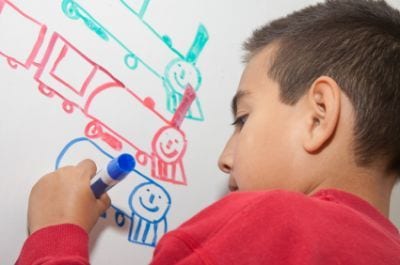 In my last blog, I not only discussed some ways you could talk to your child’s aides/teachers, etc. but I discussed how our kids can directly communicate with us, or vice versa. My child, for example, struggles with telling me about his day.
In my last blog, I not only discussed some ways you could talk to your child’s aides/teachers, etc. but I discussed how our kids can directly communicate with us, or vice versa. My child, for example, struggles with telling me about his day.
Are there “tricky” parts to communicating with your autistic child?
This happened with my child not too long ago: One day he had had a rough time during a social skills group. I had discussed with the facilitator what had happened. It was all bad. When my child and I left, I was still upset with my child’s bad behavior during social skills group.
On the ride home, I discussed this bad social skills group with my son. I told him why I was upset. We talked about all the bad things that had happened. I don’t like to get such a bad report and simply let it go. We’re talkers in our house and I do not easily forget the really bad days. I always feel I need to follow up my son and explain to him why I’m upset. During our ride home, we had a very thorough discussion.
Why was I talking to him?
Because we like to communicate. We try to be open with our son. We want him to know that he can come to us with anything. And we want him to know that we’re going to talk with him about his experiences.
What was the problem?
After we got home, I was standing in my kitchen continuing to discuss his bad social skills session. My son then looks and me and says, “Mommy, don’t you want to hear about the good stuff?”
My heart sank. I bounced back quickly and said, “Oh, course I do!” I went to him and hugged him. “Buddy,” I said, “I always want to hear the good stuff, too.”
“Why do you only want to hear the bad stuff from social group?” he asked. “That was just today,” I said. “(Your facilitator) tells me good stuff all the time!” My child paused. He processes things slowly at times but I could tell he had more to say to me. He asked, “Can I tell you one good thing that did happen today?”
“Yes!” I said with a huge smile on my face as I suddenly remembered that the facilitator had said that there was one good thing. I had forgotten the good thing. After he told me the good thing, I told him that I always want to hear both the bad and the good! I added, “If you have a really bad day, you can tell me about the bad stuff, and the good stuff, too. I really do want to hear about all of it! And, I’d feel better hearing it from you.”
What tends to happen when we’re communicating?
Unfortunately, I think parents tend to focus more on the negative, especially when it seems all the news is bad. We forget that the positives do matter! It took my child to remind me of this. And he was right. While communicating – whether it’s with your child’s aide or directly with your child—try to get both the bad behaviors AND the good behaviors.
What can we also do?
Practice communicating directly with your child. Yes, it’s easier to talk to that adult because we speak the same “language.” But your child needs the practice in an area where they’re weak.
The conversation my child and I had in our kitchen was one of the best conversations I’ve ever had with my son. We were communicating well with each other, sharing and explaining our feelings. That was a conversation I hope I never forget.
Here’s another thing to remember: This pertains to my child, but also may pertain to yours as well.
My child is observant, sensitive, very verbal, and does a fair amount of negotiating. He has feelings and, when I’m busy talking to adults, he’s often listening. He may not appear as though he’s listening, but he is. I have learned to try to involve him in any conversation that involves…him. It cannot be me talking to an adult, getting a report, and then telling my child how he messed up.
I am so pleased that my child came to me and told me about his feelings. It reminded me to keep him involved. I had to work harder to include him in conversations that were about him. In return, I’m hoping my child will try harder to help me learn about what happened in his life.
My child thinks he’s important in this world. And so I do. I have to keep finding ways to support him and help him grow. And I will.





